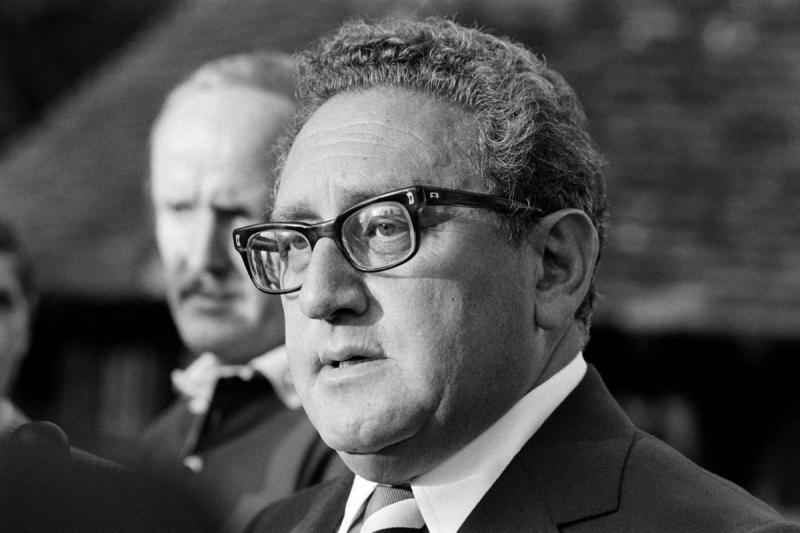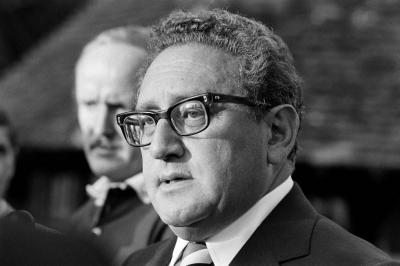Henry Kissinger, a Harvard University professor, has passed away. He became the most skilled American diplomat in managing sensitive international issues such as the Cold War, the Vietnam War, and peace between Egypt and Israel. As Chief Assistant to President Richard Nixon in foreign policy, Kissinger negotiated the withdrawal of the United States from the disastrous Vietnam War, winning the Nobel Peace Prize for his efforts. He was also the mastermind behind the policy of détente that led to the thawing of relations in the Cold War with the Soviet Union and helped dismantle the great diplomatic wall surrounding communist China for two and a half decades.
Kissinger's star rose after the 1973 war between Egypt and Israel, becoming the man of peace whose efforts led to a treaty between the neighboring countries. A century ago, a Jewish family in Germany welcomed a child, and when he reached the age of 15, in 1938, the entire family fled to the United States, fearing Nazi practices, marking the beginning of a new chapter in the teenager's life, who would become one of the most important diplomats in the United States.
Henry Alfred Kissinger became a U.S. citizen five years after arriving in the country, and his life became rich material for historians and scholars. He received accolades culminating in the Nobel Peace Prize in 1973 for his efforts to achieve a ceasefire in Vietnam, though some hold him responsible for the loss of hundreds of thousands of lives. Born in Germany on May 27, 1923, his books and policies have become reference points for diplomats in the United States, leaving a mark on most officials in the U.S. State Department for many years, through both his teaching at Harvard and his deeply rooted ideas and policies.
Kissinger served in the U.S. Army and joined Harvard University, where he taught, later taking on the role of advisor to the U.S. government on foreign policy. In 1969, President Nixon appointed him National Security Advisor, during which time he planned two unprecedented visits to China and the Soviet Union in 1972, aiming to defuse tensions with the two communist countries. The following year, Kissinger became the first American born outside the United States to serve as Secretary of State, a position he held even after Nixon's resignation and Gerald Ford's arrival.
Kissinger restored relations with China in the 1970s following a secret visit in 1971 that paved the way for Nixon's historic visit the following year. In an interview with CBS, Kissinger denied the idea that it would have been better not to take that step, stating, "You cannot exclude China from the world system." He also played a significant role in the agreement between the United States and the Soviet Union to slow down the nuclear arms race, limit conflicts, and avoid the outbreak of nuclear war. Washington, through his policies, was able to decide to withdraw from Vietnam, a conflict in which it suffered heavy losses in indirect confrontation with Moscow at that time.
Kissinger used the power of the United States in his policies to achieve what he considered balance, overlooking other issues such as human rights and idealism in dealing with crises, leading some to consider him responsible for events such as the bombing of Cambodia and the support of authoritarian regimes, resulting over the years in thousands of deaths. He indeed faced strong criticism from the progressive left in the United States, notably from Bernie Sanders.
Sanders harshly criticized former Secretary of State Hillary Clinton's pride in her close relationship with Kissinger, stating that Kissinger is "among the most destructive Secretaries of State in modern history in this country." He added, "I am proud that Henry Kissinger is not my friend. I will not seek advice from him," referring to his involvement in the bombing of Cambodia, which some view as "genocide." Hillary Clinton is one of Kissinger's notable acquaintances and has consistently affirmed her ongoing communication with him during her tenure as Secretary of State, stating that he provided her with insights about world leaders.
Clinton expressed during her campaign for the election she lost against former President Donald Trump in 2016 that she was very pleased when Kissinger told her she was "the best Secretary of State" to hold the position in many years. Kissinger is considered the architect of the peace process between Egypt and Israel, which ended the war between them, marking the first definitive silencing of an Arab front fighting Israel, and contributed to Egypt's complete shift from Soviet arms to the American side, thanks to his extensive communications with late Egyptian President Anwar Sadat.
Throughout his professional life, Kissinger continued to write and lecture on foreign affairs, and although he had not held any government position for about 25 years, he continued to stir controversy with his words, the latest being his remarks about the Ukraine crisis, advocating for granting land to Russia to halt the war, before retracting his statement. Kissinger recently conducted an interview with CBS, and when asked by the host about reactions from some questioning the "legitimacy" of such an interview, Kissinger replied, "That reflects their ignorance." When discussing the bombing of Cambodia during former President Nixon's administration, Kissinger stated, "We bombed with drones and all kinds of weapons all organizations we oppose following a guerrilla warfare system," referring to subsequent American administrations.
The veteran diplomat continued, "This meeting is about that I will turn 100 years old. And you choose a topic related to events from 60 years ago. You must understand that it was a necessary step." Kissinger remained active on the international political scene until his death, undeterred by his advancing age from traveling and meeting numerous world leaders, the last of whom was Chinese President Xi Jinping, whom he met last July in China.




